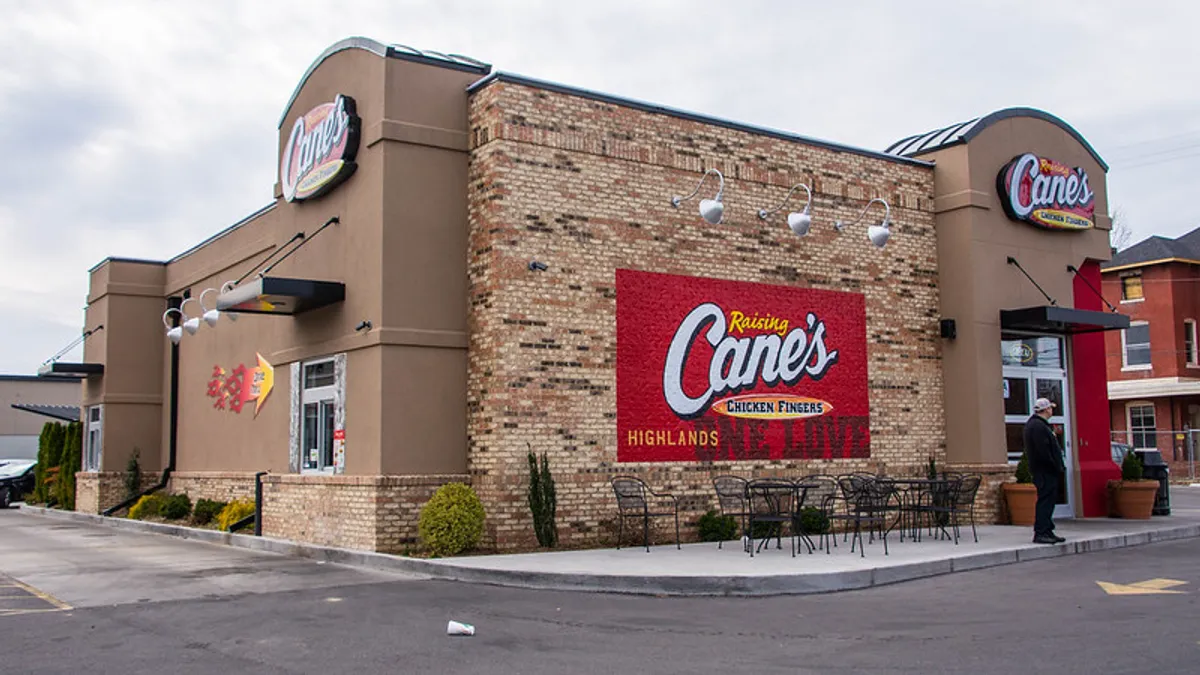Editor's Note: This article has been updated with comments from Raising Cane's.
Dive Brief:
- Raising Cane's is allocating roughly half of its corporate employees to work in its restaurants as fry cooks, cashiers and recruitment aids, Bloomberg reported Tuesday. In total, 450 corporate staff members (250 from its field business unit support team and 200 from its Dallas office) are now working at Raising Cane's restaurants, the company said in an email sent to Restaurant Dive.
- The chicken chain, which has more than 550 units, aims to hire 10,000 hourly workers in the next 50 days. The 450 office employees deployed to restaurants will remain in those posts until the goal is met.
- This labor strategy is part of Raising Cane's efforts to contend with an unprecedented industry-wide employee shortage, which has pushed major chains to raise wages and roll out hiring bonuses and other benefits to attract applicants, as it grows its store footprint.
Dive Insight:
Finding 10,000 restaurant employees in a month and a half's time is a tall order. The number of workers in the foodservice sector fell by 42,000 to 11.34 million in August, according to data from the Bureau of Labor Statistics.
"It's no secret that today's hiring market is a challenge," Raising Cane's co-CEO AJ Kumaran in a statement to Bloomberg. "Ahead of our massive growth next year, having the support we need is critical."
Raising Cane's said this push to hire 10,000 workers is meant to support the chain's 2022 growth, and that the company aims to "increase current staffing by 10% to meet [its] current business trajectory needs."
Like many QSR chains, Raising Cane's only felt a temporary sting from the pandemic's onset. At one point, sales were down 30%, co-CEO and founder Todd Graves told Forbes in April, but the company has since recovered. At that time, the chain planned to open 75 new units in 2021 and 100 additional restaurants in 2022.
Graves told Forbes that though staffing for an expanded store network will be challenging, he didn't plan to offer bonuses or other temporary incentives to attract labor.
"Those monetary incentives generally don't last long. Sometimes you get the people who come into your business for the wrong reasons. Maybe they get extra bonuses, or they get that or this," he told Forbes. "Then, when the money runs out, they leave. Stick to your guns and talk about the benefits you have internally in your company. You'll get better crew members and they'll stay with you longer."
Still, the company has recently made other investments to strengthen recruitment and retention, Raising Cane's said. The company has invested $25 million in employee wages so far this year, adding raises for hourly workers and managers. Raising Cane's has also invested in new 401K plans, internal promotion programs and financial wellness offerings.
Last year, the chain launched its Restaurant Partner Program (the term it uses to refer to general managers) to set these employees up to have a net worth of more than $1 million within 15 years.
It's possible the company's decision to move corporate staff into restaurant-level roles signals this gimmick-free hiring strategy isn't working quickly enough, however. But it's not the first time a restaurant chain has used the tactic — Washington, D.C.-based &pizza deployed office employees to work alongside hourly staff in its restaurants during restaurant lockdowns in March 2020.
Still, the fact that this tactic is being used more than a year and a half after initial pandemic disruption doesn't bode well. Major QSR competitors are also adapting to the labor pressure, with Chipotle, Darden, McDonald's and Starbucks, hiking pay and offering extra benefits in the hopes of boosting staff numbers.













